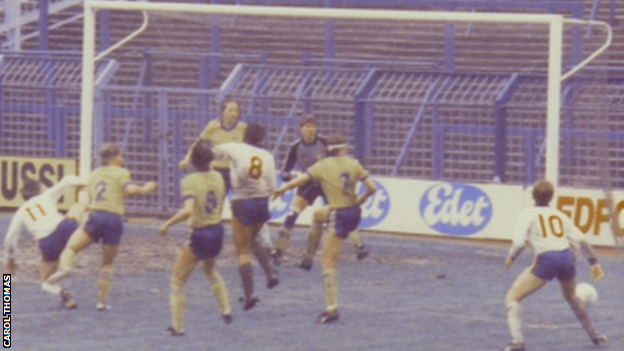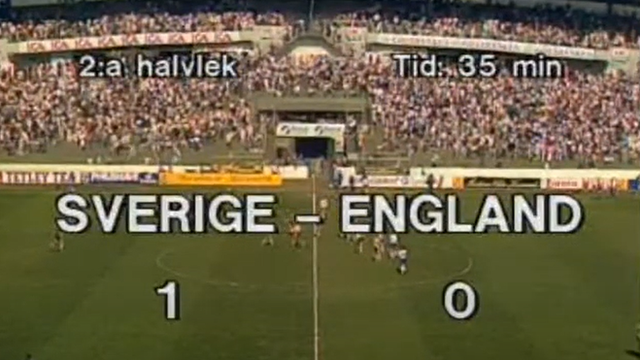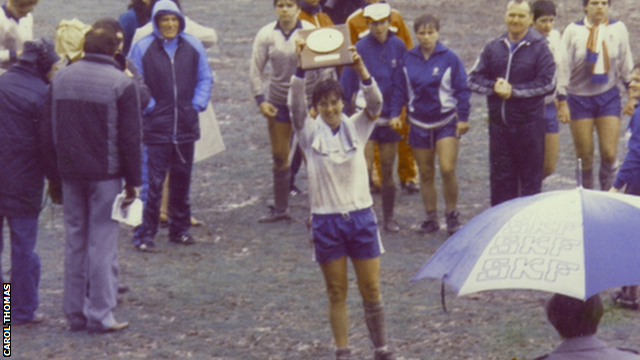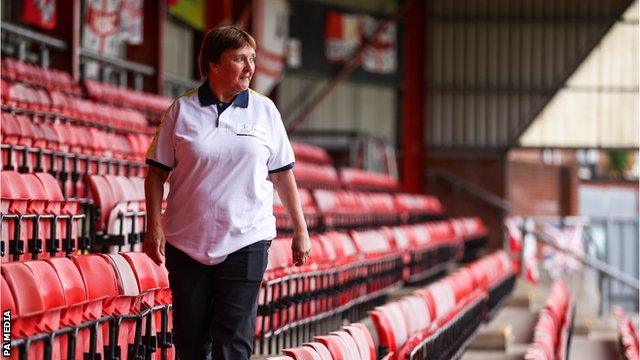Euro 2022: Remembering the last time England's women played a Euros final in England
- Published

Empty terracing at Luton Town provided the backdrop to the second leg of the 1984 Women's Euros final between England and Sweden
Uefa Women's Euro 2022 final: England v Germany |
|---|
Venue: Wembley Stadium Date: Sunday, 30 July Kick-off: 17:00 BST Coverage: Watch live on BBC One, BBC iPlayer, BBC Sport website; listen to live commentary on BBC Radio 5 Live; text commentary on the BBC Sport website |
"Alan, my husband, didn't come to watch me because we couldn't afford it. England's team was made up of amateur players - playing for your country back then cost money."
Carol Thomas is recalling the events of 1984, the year of the first European Women's Championship when England played Sweden in the final over two legs in Gothenburg and Luton.
It was a truly different era.
Back then they played halves of 35 minutes instead of 45, a smaller football was used and clubs in London turned down the chance to host the second leg.
While Sunday's Euro 2022 final with Germany is being televised live to millions on BBC One and is an 87,000 sell-out at Wembley, just 2,567 watched England lose on penalties at Kenilworth Road the last time the Lionesses played a Euros final on home soil.
With no television coverage in England back then, the event passed without much notice.
"There was little attention paid to it in England," recalls Thomas, who was England's captain 38 years ago.
"It was mainly the Swedish press that came over with their team. They televised it and put it in their papers."
With the Lionesses one win from being crowned European champions for the first time, BBC Sport looks back at the events of 1984 and how it contrasts with this summer's memorable tournament.
'I got permission off work to play in final'
The second leg of the final at Kenilworth Road was played on 27 May and the back pages of England's national newspapers were building-up to the European Cup final between Liverpool and Roma in Rome three days later.
Everton had recently defeated Watford to win the FA Cup, Frankie Goes To Hollywood were ripping up the UK singles charts and the miners' strike - the biggest industrial dispute in post-war Britain - was under way.
England had narrowly lost 1-0 two weeks earlier in the first leg at the Ullevi Stadium in Gothenburg - scene of Aberdeen's famous win over Real Madrid in the 1983 European Cup Winners' Cup final.
Thomas had to get special permission from her bosses at Northern Dairies in Hull for time off to play in Sweden, while her husband did not travel to Scandinavia because of the costs involved.
"If we were flying to Sweden, we'd have had to pay our train fare and petrol money to get to Heathrow Airport," says Thomas, a right-sided defender who won 56 caps for her country.
"Fortunately my bosses were very good to me and I didn't have to use up any holiday time. Some of my team-mates were not so fortunate and had to take time off without pay to represent England."

In 1984, halves of 35 minutes were played at the Women's Euros
A goal by Pia Sundhage, who now manages Brazil, ensured Sweden travelled to England with a slender lead.
Coached by Martin Reagan, who served in World War Two as a staff sergeant tank commander and was a former winger with Middlesbrough, England had a fortnight to prepare for the return in what was then known as the European Competition for Women's Football final.
"We got together on the Friday before the game on the Sunday," Thomas adds. "Late Friday night it started raining and it didn't stop until just before the kick-off.
"The game at Luton is known as the battle of the Kenilworth bog."

Carol Thomas lifts the runners-up trophy at Kenilworth Road following England's defeat to Sweden
'I had to give £75 TV fee away'
A record 500,000 tickets were sold before the start of Euro 2022, which has featured 16 teams playing 31 matches over 25 days. Yet it was a very different story back in 1984.
Then, four teams - England, Sweden, Italy and Denmark - featured in the tournament, with six games spread over seven weeks and played in all four countries.
After topping a qualifying group containing Scotland, Northern Ireland and the Republic of Ireland with a 100% record, England defeated Denmark 2-1 in front of an estimated 1,000 crowd in the semi-final first leg at Crewe and would go on to win 3-1 on aggregate.
The combined attendance for the whole tournament was around 20,000.
"For some reason, the men would only let us play with a size four football and matches lasted 70 minutes. I think they thought women couldn't manage anything else," says Thomas.
Linda Curl, who had made her England debut as a 15-year-old, cancelled out Sweden's aggregate lead in the opening half at Luton and that is how it stayed. With no extra time, the final was decided on the penalties.
Theresa Wiseman saved Helen Johansson's penalty but both Curl and Lorraine Hanson had their spot-kicks saved by Elisabeth Leidinge as the Swedes triumphed 4-3 in the shootout., external
Back in 1984, Gillian Coultard, who played for the Lionesses in the final, recalls her club Doncaster Belles using car headlights for floodlights.
"There was probably one man and his dog in terms of reporters from England," Coultard told the Guardian about the game at Luton., external

Carol Thomas is working with professional networking site LinkedIn, a national sponsor of Euro 2022, to promote workplace equality and role models
"The Swedes found it very strange because, at that time, Scandinavian football was at the top and they probably had six or seven reporters with them and the two-legged final was being screened live in Sweden."
Thomas also remembers "big London clubs" declining the opportunity to stage the return leg in England due to a lack of interest.
"Luckily Luton Town offered their ground. I remember us producing a great performance," she adds.
"Just getting to the final is a great memory and for me to be the captain as well, that just topped it off."
Following the presentations on the pitch after full-time, England's players dispersed to various parts of the country to carry on with their day jobs.
"Most of us would have been working the following morning," Thomas adds. "I went down to London for an interview with Frank Bough and Selina Scott on the BBC's Breakfast Time television programme.
"I got a fee of £75 for the interview. I didn't get to keep it. It went straight to the Women's Football Association.", external

'It's just funny that he had these insecurities' - Hear Sean Ono Lennon's chat with his dad's former Beatles bandmate Paul McCartney
How did gambling become a game of life and death? A powerful documentary on the devastating personal consequences of gambling addiction
